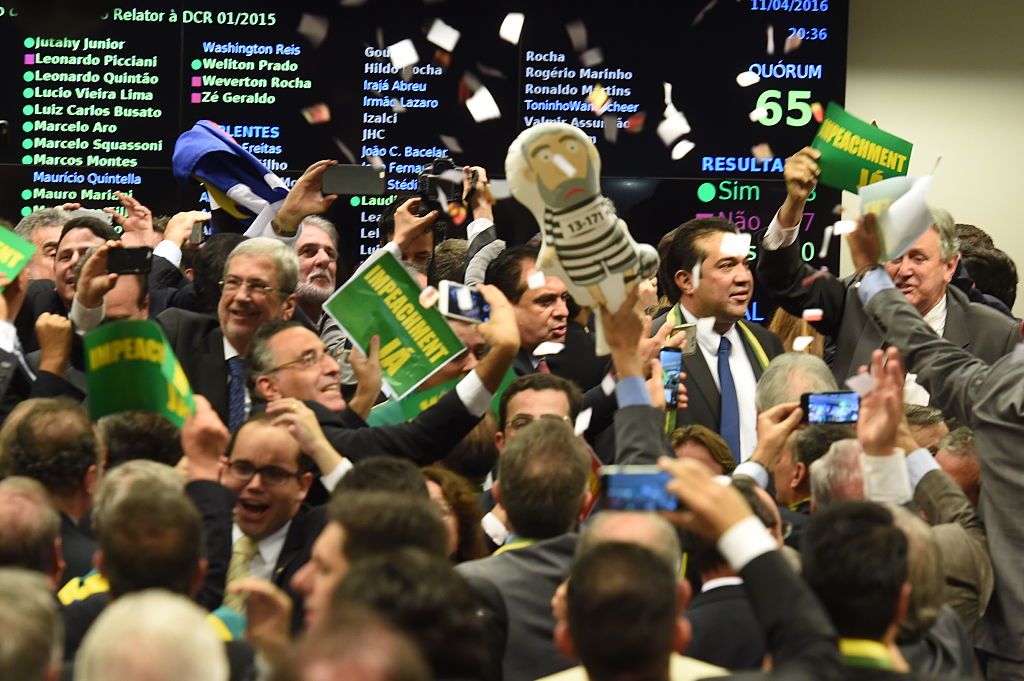Brazilian congressional committee advances impeachment against President Rousseff


A free daily email with the biggest news stories of the day – and the best features from TheWeek.com
You are now subscribed
Your newsletter sign-up was successful
On Monday night, the impeachment committee of Brazil's lower house, the Chamber of Deputies, voted to recommend impeaching President Dilma Rousseff on charges that she illegally bolstered state finances with a bank loan while running for re-election. Rousseff denies the charges. The 38-27 vote was slightly more lopsided than expected, and the full Chamber of Deputies is set to vote on Sunday on whether to send the case to the Senate for trial. Two thirds of the lower house, or 342 deputies, need to approve the impeachment measure for it to pass; currently, 298 delegates favor impeachment and 120 oppose it, according to the latest tally from Brazilian newspaper O Estado de S. Paolo.
The setback for Rousseff was expected, in part because the lower house is tightly controlled by Rousseff's political nemesis, House Speaker Eduardo Cunha, who is third in line to the presidency — and also under investigation for allegedly accepting a $5 million bribe as part of the huge Petrobras scandal. If a simple majority of the Senate approves an impeachment trial, Rousseff will have to step down for up to 180 days during the trial and her vice president, Michel Temer — from an opposition party — will take over.
In a twist, Brazilian media played an audio clip on Monday of Temer practicing a speech to assume power should Rousseff step aside, a leak Temer's office calls accidental. A court also ruled earlier this month that if Rousseff is ousted by a two-thirds vote in the Senate, Temer has to face impeachment for the same charges that will have sunk Rousseff.
The Week
Escape your echo chamber. Get the facts behind the news, plus analysis from multiple perspectives.

Sign up for The Week's Free Newsletters
From our morning news briefing to a weekly Good News Newsletter, get the best of The Week delivered directly to your inbox.
From our morning news briefing to a weekly Good News Newsletter, get the best of The Week delivered directly to your inbox.
A free daily email with the biggest news stories of the day – and the best features from TheWeek.com
Peter has worked as a news and culture writer and editor at The Week since the site's launch in 2008. He covers politics, world affairs, religion and cultural currents. His journalism career began as a copy editor at a financial newswire and has included editorial positions at The New York Times Magazine, Facts on File, and Oregon State University.
-
 Nordic combined: the Winter Olympics sport that bars women
Nordic combined: the Winter Olympics sport that bars womenIn The Spotlight Female athletes excluded from participation in demanding double-discipline events at Milano-Cortina
-
 Samurai: a ‘blockbuster’ display of Japanese heritage
Samurai: a ‘blockbuster’ display of Japanese heritageThe Week Recommends British Museum show offers a ‘scintillating journey’ through ‘a world of gore, power and artistic beauty’
-
 BMW iX3: a ‘revolution’ for the German car brand
BMW iX3: a ‘revolution’ for the German car brandThe Week Recommends The electric SUV promises a ‘great balance between ride comfort and driving fun’
-
 Nobody seems surprised Wagner's Prigozhin died under suspicious circumstances
Nobody seems surprised Wagner's Prigozhin died under suspicious circumstancesSpeed Read
-
 Western mountain climbers allegedly left Pakistani porter to die on K2
Western mountain climbers allegedly left Pakistani porter to die on K2Speed Read
-
 'Circular saw blades' divide controversial Rio Grande buoys installed by Texas governor
'Circular saw blades' divide controversial Rio Grande buoys installed by Texas governorSpeed Read
-
 Los Angeles city workers stage 1-day walkout over labor conditions
Los Angeles city workers stage 1-day walkout over labor conditionsSpeed Read
-
 Mega Millions jackpot climbs to an estimated $1.55 billion
Mega Millions jackpot climbs to an estimated $1.55 billionSpeed Read
-
 Bangladesh dealing with worst dengue fever outbreak on record
Bangladesh dealing with worst dengue fever outbreak on recordSpeed Read
-
 Glacial outburst flooding in Juneau destroys homes
Glacial outburst flooding in Juneau destroys homesSpeed Read
-
 Scotland seeking 'monster hunters' to search for fabled Loch Ness creature
Scotland seeking 'monster hunters' to search for fabled Loch Ness creatureSpeed Read
